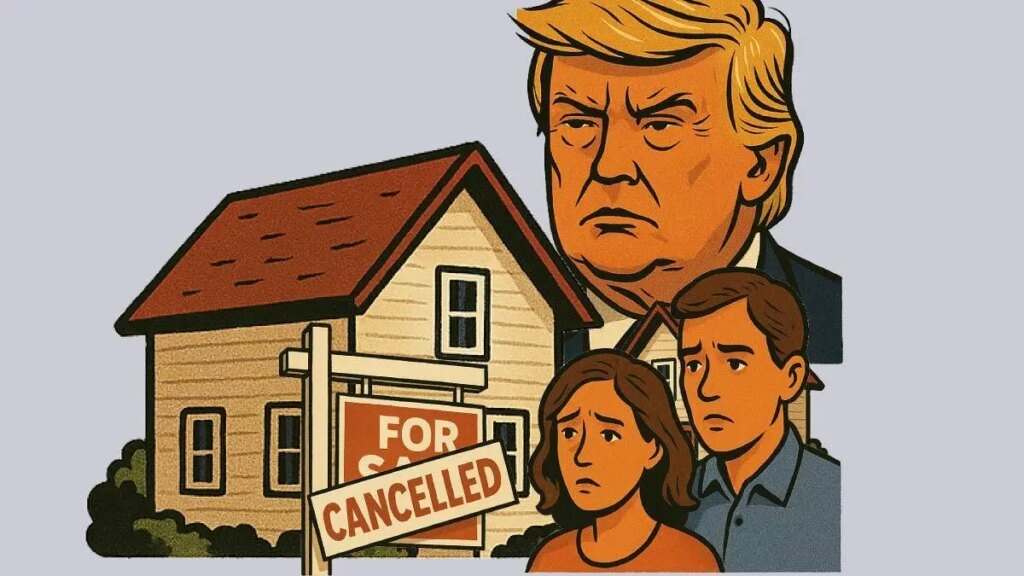Housing safety net
Following the recent announcement of tariffs by the Trump administration, global stock markets experienced a sharp decline, leading to increased uncertainty about the future of the economy.
“The stock market has seen its largest losses since 2020. The anticipated impacts of the administration’s tariffs, coupled with general economic uncertainty, are likely to result in businesses holding back on hiring and individuals and families being more cautious about spending,” stated Lisa Sturtevant, the chief economist at Bright MLS.
For Stella, the repercussions of this economic turbulence could go beyond just a canceled deal on Friday, as potential homebuyers weigh the risks against their desire to purchase a property. Despite the uncertainty, Stella believes that it is still a favorable time to invest in real estate for those who are able to do so.
“While I may not be well-versed in global markets, I do understand that real estate is a stable investment. Therefore, in times of uncertainty, investing in real estate is a wise decision,” he remarked.
In the Greater Boston area, Stella predicts a modest increase in home values of 2% to 5% this year, a rate that was considered normal before the COVID-19 pandemic.
“Real estate is a secure asset to invest in. Given the tariffs, real estate becomes an even more valuable investment for your money,” Stella emphasized.
Despite Stella’s perspective, there are conflicting factors influencing whether consumers will take the leap to purchase a home. The economic conditions resulting from the recent tariffs announcement have raised concerns about job security and inflation, causing some potential homebuyers to hesitate. However, the lower mortgage rates resulting from the economic slowdown have piqued the interest of many buyers waiting for favorable rates.
“While the tariff announcements have led to a decrease in mortgage rates, some prospective buyers remain apprehensive about job security and inflation, despite the lower rates,” noted Sturtevant.
Conflicting opinions
Brian Huskey, the broker-owner of ERA American Real Estate, acknowledges that buyers in certain markets may be impacted by the stock market. In Billings, Montana, however, consumers are enthusiastic about the lower mortgage rates, which have revitalized the real estate market.
“I’ve received calls from several buyers who are excited about the declining rates. The market here has been stagnant all winter, and these rates are expected to reinvigorate it,” Huskey shared.
In Southern California, Michael Nourmand, the president of Nourmand & Associates, holds a different view. He doubts that the reduced rates will be sufficient to motivate a surge in home purchases.
“Buyers have become accustomed to rates around 6%, and unless there is a significant drop, I don’t foresee a significant change in buying behavior,” Nourmand expressed.
In Dallas-Fort Worth, Texas, Mandy Nichols of Brixstone Real Estate reminisced about the brisk sales during the pandemic peak and expressed hope for a resurgence in buyer activity.
“The market has slowed down significantly, and I’m hopeful for an upturn this spring. The current market conditions are perplexing,” Nichols observed.
While uncertainty looms over the housing market, Mike Pappas, CEO of The Keyes Company, remains optimistic that sales transactions will persist, fueled by life events that prompt individuals to buy or sell property.
“Life’s uncertainties are driving hesitant sellers to act. We are witnessing an increase in inventory as more individuals list their properties due to various life events,” Pappas remarked.
Hobbled construction market
In addition to affecting homebuyers’ uncertainty, the Trump administration’s tariffs are expected to directly impact the new construction market.
In regions like Southern California, which are still recovering from wildfires, rising commodity prices are likely to burden builders and consumers alike.
“The tariffs, combined with the need to rebuild entire towns devastated by wildfires, will likely result in increased construction costs, posing a challenge for consumers,” Nourmand explained.
Stella anticipates a scenario where existing homeowners opt to sell rather than renovate or expand their homes due to the escalating costs of construction materials.
“The rising costs of materials like lumber and steel will be passed on to consumers, making additions too expensive. Homeowners may choose to buy a new property instead,” he predicted.
While the full impact of the tariffs is yet to be realized, Stella mentioned that builders are quoting homeowners significantly higher prices for additions in response to increased construction costs.
“The escalating costs may deter some homeowners from renovating, but it could lead to an increase in housing inventory, which could have a positive effect on the market,” Stella concluded.

